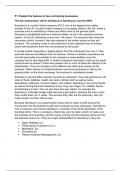Other
Uni1 exploring business: Sainsbury's and the NHS
- Module
- Unit 1 - Exploring Business
- Institution
- PEARSON (PEARSON)
Received distinction. Message for any help. The document has everything from pass criteria to distinction covering sainsburys and the NHS.
[Show more]



